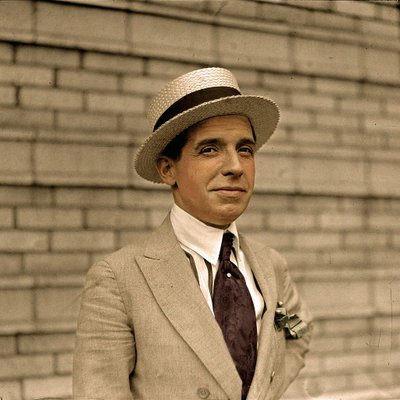Bernie Madoff and the lure of Ponzi Schemes

If you’re interested in savings and investments, you’ve probably heard of American fraudster Bernie Madoff, the man responsible for the world’s largest Ponzi scheme.
Madoff’s insatiable appetite for money led him to coordinate an elaborate Ponzi that embezzled more than US$64 billion (£46bn).
For 17 years until his arrest in 2008, Madoff conned thousands of financial institutions, charities, and people who invested in his company Bernard L. Madoff Investment Securities.
But what is a Ponzi scheme, and how can you avoid them?
Firstly, the name derives from Charles Ponzi (pictured), a 1920s conman who served 14 years in prison after promising investors 50% returns in only 90 days. A Ponzi pays existing investors with money from new investors, so the scheme appears to generate revenue and profits.
In truth, legitimate activity is minimal, and the business is simply a cycle of payments. Fraudsters who run these schemes use the cash deposited by new investors to:
- Pay old investors
- Subsidies a lavish lifestyle
How to avoid a Ponzi scheme
The scam may work initially, but eventually it will crash when income dries up, and there’s no money left to pay investors. So, how do you spot a Ponzi scheme before it is too late? Ah, the million dollar question…
Scammers are often educated professionals with extensive knowledge of the money markets. Such was the case with Madoff whose fraud remained undetected for 18 years largely because he was a:
- Well-respected New York financier
- Former chairman of the NASDAQ stock exchange
However, even if you are dealing with the most experienced swindler, there are still red flags to look out for. The most obvious sign is higher-than-average returns with little or no risk. Every investment has an element of risk, so be wary of any scheme guaranteeing risk-free returns.
Another red flag is unusually consistent returns, regardless of market conditions, especially at the start. It’s important to understand that Ponzis are constantly popping up everywhere, and even the most educated people can be fooled.
Cunning conmen
A professional trickster is unlikely to suggest ridiculously high profits as this raises suspicion. For this reason, Madoff’s investments offered reasonable, albeit fictitious, returns.
The clever lure of these schemes can dazzle the most seasoned investor, the type of person who trusts their own judgment enough to sometimes overlook due diligence. And spotting them is not so easy – Ponzi schemes are far more sophisticated than your standard phishing emails.
Truly, anyone can get duped. To quote American investment fraud expert Pat Huddleston, the moral of the story is that:
“If it sounds too good to be true, you’re dealing with an amateur.”
Understanding the winding up petition: A crucial tool
In the world of insolvency, a winding up petition holds significant importance. When a company has received a statutory demand (SD) and fails to raise…
Read MoreUrgent Call to Action: Have You Invested in Beech Holdings (Manchester) Ltd?
If you or anyone you know has invested in Beech Holdings (Manchester) Ltd, it’s time to take action immediately and get in touch. The Situation…
Read MoreBankruptcy Annulment: A Fresh Start for Financial Recovery
Bankruptcy is often viewed as a last resort for individuals overwhelmed by debt, offering a path to financial relief but also leaving a significant mark…
Read MoreCastle Trust and Management Services Ltd- The Big Problem for the Gibraltar Financial Services Commission
The collapse of Castle Trust and Management Services Ltd (CTMS) has raised serious questions aboutthe role and effectiveness of the Gibraltar Financial Services Commission (GFSC)…
Read More



